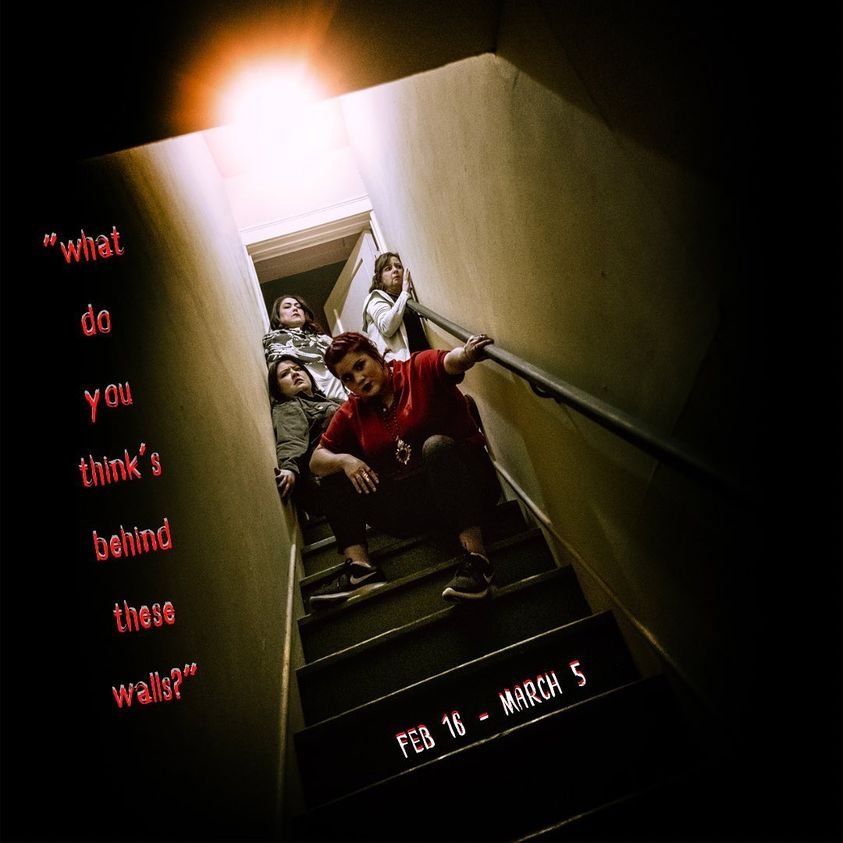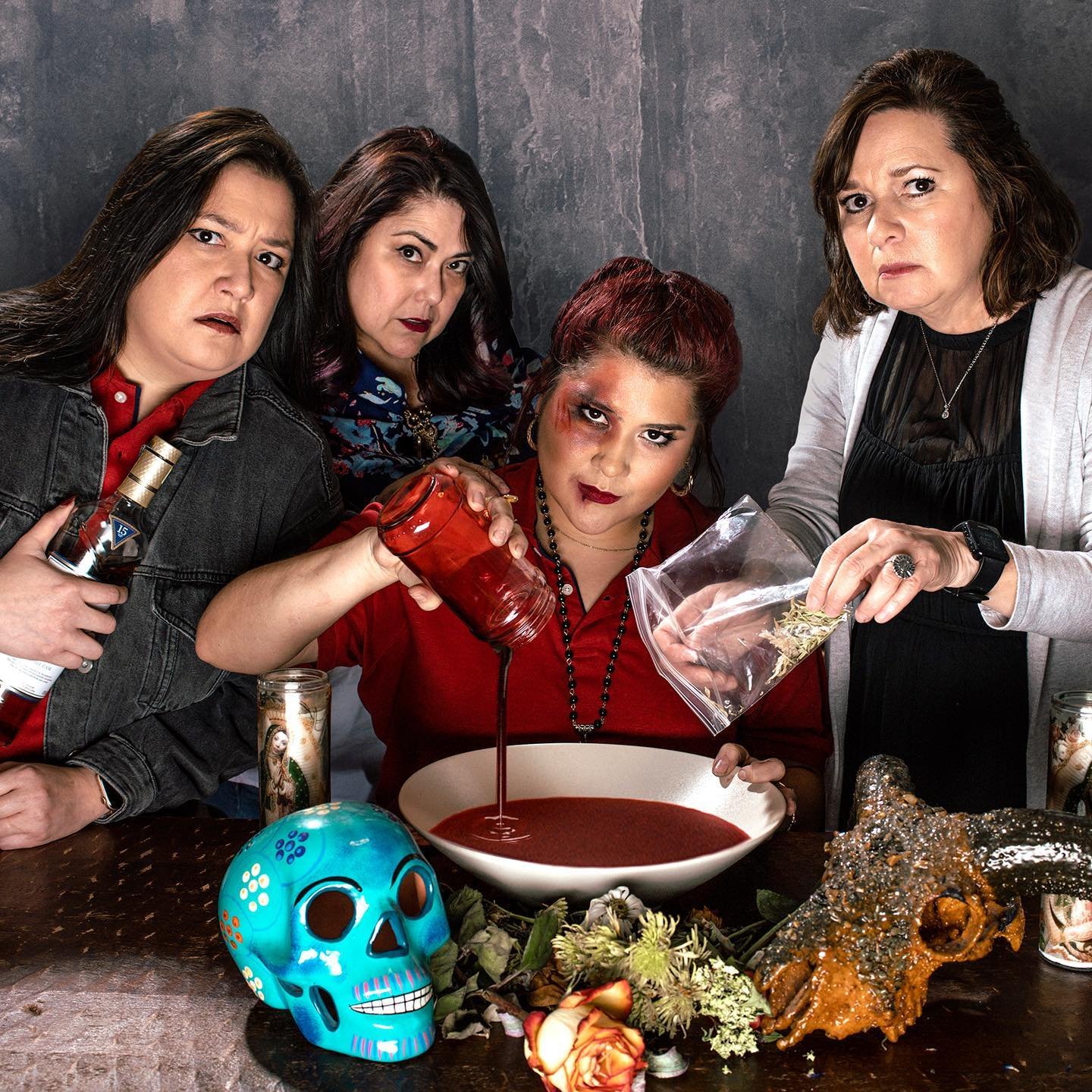Man Cave @ Kitchen Dog Theater
Photos by Jordan Fraker
—Martha Heimberg
The lights go down, and thunder rattles ominously through Kitchen Dog Theater. Lightning flashes with a shock through the high windows of an elaborately furnished basement bar (designed by Jeffrey Schmidt), complete with leather chairs and a trophy deer head on the wall. Even spookier than the monster storm booming outside is the woman folding laundry from the dryer next to the bar, oblivious to the hair-raising sounds (from Brian McDonald) and lighting effects (Aaron Johansen) that have the rest of us hyper-alert for a sudden vicious attacker—at the very least.
We’re in the Man Cave, KDT’s regional premiere of John J. Caswell, Jr.’s spirit-haunted political drama. Set in Sedona, Arizona during the monsoon season, Man Cave is a revealing mash-up of horror movie terror with some sadly familiar themes: destructive border immigration policies, brutal domestic violence, and the slaughter of indigenous peoples. How can you get all that covered in just 95 minutes (with a 10-minute intermission) when our national and state governments have failed for years?
Magic.
At the center of the play are three Mexican American domestic workers with varying degrees of conflicted emotion about their heritage, their servitude in their adopted country, and their very survival. Imaculada (a hard-edged, serious Gigi Cervantes) runs a huge house for the rich congressman whose basement hangout contains the action, natural and supernatural, that happens over the family’s three-day absence. Imaculada is so eager to please that she’s even had lap band surgery, to look more like a svelte nanny when she travels along on political campaigns. Then Rosemary (a fiery, vulnerable Fatima Y. Flores) and her recovering alcoholic lover Lupita (a funny, sardonic Gloria Vivica Benavides) arrive, running from the white cop Rosemary lives with, who’s beaten her face to a bloody pulp. Again.
Nervous Imaculada lets her old friends stay, but for “just one night”—and only on the basement sofa. Things go bump before it even gets dark outside, and supernaturally sensitive Rosemary announces she knows why owners keep moving out of this high-dollar house. It’s haunted by the spirits of the dead buried under the foundation in a mass grave. Shiver.
More lightning strikes. Then Rosemary dumps her abuser’s nail clippings and a jar of goat’s blood onto the table, and declares she needs the vibes of these tortured souls to make a magic deal. Creepy music not required. They’ll help the trio maim and destroy the bastard cop, and their spirits can then go to rest. Not sure how those acts balance, but Rosemary’s been reading old spell books that belonged to her mother, “a fucking wetback,” according to a frustrated Imaculada, who just wants everybody out before her boss gets home.
The next morning Lupita, now drinking beer for breakfast, is cracking wise about her lover’s resorting to old-country superstitions. Rosemary’s mother, Consuelo turns up (a witchy, commanding Sheila D. Rose), looking vaguely sinister and cursing as expertly as her daughter and friends. Mom’s fury stems from her failure to thoroughly Americanize her child, it seems, while Rosemary yearns for her Mexican self. “I feel I’m flailing between two places,” she says, appealing to the dead souls below her feet with whom she shares the same trembling unease.
Act Two only intensifies the sense of impending doom. The women talk of their personal trials and deep fears for those they love. They joke with each other to ease the pressure. Then suddenly, huge headlights flash on and off, glasses crash from the bar, and the deer head (covered over by Consuelo in a hilarious scene), crashes to the floor. Ay, Dios mío. The aging witch agrees to use her own long-abandoned psychic powers to help them. When the spell book is pulled out and the women begin to repeat its ancient words, all hell of a finely synchronized acting company breaks loose. Talk about possession. It worked on me, anyway.
The final scene is played almost entirely in Spanish, so we know the women have at least restored to themselves the language aspect of their Mexican identity. Hard for this gringa to follow, but a small mirror over the bar has minimal English translations of their conversations: we get the gist of the dialogue. And for sure, we understand what it’s like to work hard to understand what’s going on in a language not your own. Whether the spell works for the spirits, for Imaculada’s long-gone son, or to solve the enormous problems facing them—and by extension, other such immigrants—is left on the floor beside the fallen trophy head.
One exhausted woman feels a tremor below her and says, “Nothing has changed,” her voice flat with defeat. Her younger friend tells her, “No, but it’s about to.” I read that writing on the wall of the bar mirror, translated from the Spanish by Yolanda Castro, according to the program notes. Damn, I really need to learn to speak Spanish.
Director Christie Vela understands the linkage between desperation and magical thinking, and keeps the spooky volume provided by this skilled production team on high, while moving her real flesh-and-blood coven forward, toward some level of resolution in their difficult lives. Exhale.
WHEN: Through March 5
WHERE: 2600 N. Stemmons Fwy, Dallas

